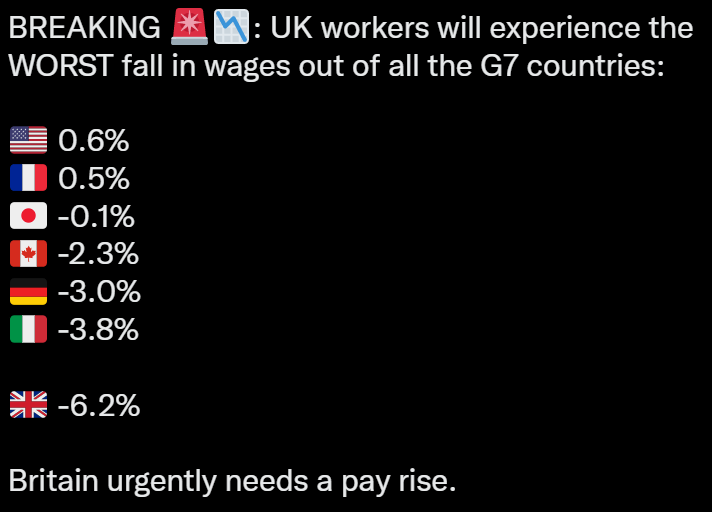Always behind the living experience of working class people, the Bank of England now admits that inflation is heading towards 13 per cent by the end of the year.
That is wrong on two accounts: the estimate from the Resolution Foundation thinktank is for 15% by the end of the year, and taking into account the leap in the cost of food, energy, transport and housing – which form the bulk of most families’ week by week spending – inflation is already at least 15%.
The Bank of England has now accepted that Britain faces a protracted recession and “the worst squeeze on living standards in more than 60 years”, yet as an indication of who will not suffer from that prediction, the FTSE100 share index actually rose.
The Bank raised base rates by half a percent, which doesn’t sound much, but it means that since last December rates have risen by 1.5% and in terms of housing costs, that rise translates into an additional £90 a month for an average mortgage holder.
Even factoring in the meagre energy ‘support’ offered by the government, the BoE forecasts show that after-tax income would fall in real terms this year and next, the biggest fall since data was collected in the 1960s. As the Trades Union Congress has pointed out, the expected fall in living standards in the UK is the worst in Europe.
The Tory government and the Bank of England have consistently underestimated the squeeze on living standards. It is not due to the war in Ukraine, but to an economic system that is rigged in the interests of capital, for the rich and the super-rich. The giant oil companies have all announced massive and, in some cases, record profits, giving billions to shareholders as dividend and share buy-backs.
Big companies fail to pass on oil price decreases
Meanwhile, it was revealed that although the big oil corporations were now buying wholesale petrol on world markets at the now reduced price that applied three months ago, only part of the drop in world market prices has been passed on to workers forced to rely on their cars and vans for work. The equivalent of £60 a petrol tank could be shaved off the price of petrol if the oil giants weren’t holding back.
Even Rachel Reeves, Labour’s Tory-lite Shadow Chancellor, has called the profits of the oil giants “eye-watering” and she criticised the Tory government for giving “significant tax breaks” to those companies.

The government’s pathetic £400 rebate towards energy costs is a drop in the ocean, but some will not even get that. Piling one scandal upon another, Citizens Advice are warning that many private tenants will find their rebate is passed to their landlords and they may not see a penny of it, despite paying the massively increased bills.
Come October, the energy price cap will rise again, and it is estimated that it will rise to £3,600 a year (or more) for the average household. Ofgem, the so-called energy ‘regulator’ has announced that price cap adjustments will be every three months instead of every six.
Referring to the profiteering of the oil companies, Sharon Graham, Unite general secretary, said that “the British economy does not work for workers and their families. Britain’s real crisis isn’t rising prices it’s an epidemic of unfettered profiteering.”. She is absolutely correct, but she needs to make sure, therefore, that her union does not walk away from having a political role, no matter how poor the current Labour leadership might be.
Tory contest between Tweedle-Dum and Tweedle-Dee
The starting point to defending workers’ living standards is strong union organisation in the workplace and a militant, fighting trade union and Unite might be one of those unions that is setting the pace in that regard. But trade union action needs to be supplemented by political action to help consolidate gains that are made in the workplace and ultimately to fight for a society that runs ‘for the many, not the few’.
Given the relentless squeeze on living standards, it is little wonder that workers in may sectors of industry and in many workplaces are taking up a fight for decent wage rises, at least to try to match the increases in prices. Apart from the big national strikes in the headlines, the most recent walkouts in the last day or two have been in at least two Amazon warehouses, in Rugely, near Birmingham, and Tilbury, East of London.
It is notable that the Tory leadership contest, between Tweedle-Dum and Tweedle-Dee, has given no emphasis at all to the decline in living standards for the mass of the population. It is as if that contest is being conducted on some weird astral plain inhabited only by geriatric Conservative Party members, a region completely unknown to the big majority of the population.
Given that, it is even more of a disgrace that the Labour leadership has failed to state clearly and unambiguously, that “working class people should not suffer cuts in their living standards”. By steadfastly refusing to back workers who are striking to maintain their living standards, Kier Starmer is effectively accepting the logic of the governor of the Bank of England and the Tory party – that a cut in living standards is somehow necessary.
Labour MPs and councillors should defend workers’ living standards
It is the responsibility of every Labour MP – the clue is in the name – to defend the living standards of working class people against the depredations of a rigged system. If the system cannot afford to maintain living standards, despite the UK being the fifth richest nation on the planet, then the system needs to change.
Even at local level, any Labour councillors who are worth their salt should be demanding that councils mobilise cash reserves to support families in economic distress, which is increasingly the majority. Labour councillors should demand measures such as a freeze or a reduction in council rents, a freeze on the cost of leisure and other facilities and the implementation of free school meals across the board for all school children. These things are possible and Labour councillors should demand them.
We are living in extraordinary times and the cosy conformity of the booming sixties and seventies no longer has a place in politics. We are facing a life-or-death struggle between two diametrically opposed ideas about how society should be run.
Should we continue, as now, with a so-called ‘free’ market economy, which is set up to enrich the already rich, at the expense of the big majority? Or should we have a society where the wealth, resources, and know-how are socially-owned, managed democratically and planned in the interests of all?
The answer to this question will be determined by the balance of class forces in the coming years, and by the degree to which the labour movement becomes aware of its historic role and purpose. But for any socialist or Labour representative today, the starting point has to be a clear commitment and determination to defend living standards.



